 Dr. Jennifer Francis (Action Team Co-Chair) earned a B.S. in Meteorology from San Jose State University in 1988 and a PhD in Atmospheric Sciences from the University of Washington in 1994. As a professor at Rutgers University since 1994, she has taught courses in satellite remote sensing and climate-change issues, and also co-founded and co-directed the Rutgers Climate and Environmental Change Initiative. Presently she is a Research Professor with the Rutgers Institute of Marine and Coastal Sciences and studies Arctic climate change and Arctic-global climate linkages. She has served on numerous national boards, committees, and councils, including for NSF, NASA, the National Academies, and the American Meteorological Society. She and her husband circumnavigated the world in a sailboat from 1980-1985, including Cape Horn and the Arctic, during which her interest in weather and the Arctic began. Email: francis [at] imcs.marine.rutgers.edu
Dr. Jennifer Francis (Action Team Co-Chair) earned a B.S. in Meteorology from San Jose State University in 1988 and a PhD in Atmospheric Sciences from the University of Washington in 1994. As a professor at Rutgers University since 1994, she has taught courses in satellite remote sensing and climate-change issues, and also co-founded and co-directed the Rutgers Climate and Environmental Change Initiative. Presently she is a Research Professor with the Rutgers Institute of Marine and Coastal Sciences and studies Arctic climate change and Arctic-global climate linkages. She has served on numerous national boards, committees, and councils, including for NSF, NASA, the National Academies, and the American Meteorological Society. She and her husband circumnavigated the world in a sailboat from 1980-1985, including Cape Horn and the Arctic, during which her interest in weather and the Arctic began. Email: francis [at] imcs.marine.rutgers.edu
 Dr. Henry P. Huntington (Action Team Co-Chair) earned his bachelor’s degree in English at Princeton University and his master’s and doctorate in Polar Studies at the University of Cambridge. He lives with his wife and two sons in Eagle River, Alaska, where he works as an independent researcher and on Arctic Ocean conservation for the Pew Charitable Trusts. His first encounter with sea ice took place at age 5, when he slipped on a floe in Stonybrook Harbor, New York, resulting in five stitches above his left eye. He recovered well enough to take an interest in the Arctic and its inhabitants. He has made long trips in the Arctic by dog team, open boat, and snowmobile. Huntington’s research activities include reviewing the regulation of subsistence hunting in northern Alaska, documenting traditional ecological knowledge of beluga whales and bowhead whales, examining Iñupiat Eskimo and Inuit knowledge and use of sea ice, and assessing the impacts of climate change on Arctic communities and Arctic marine mammals. Huntington has been involved in a number of international research programs, such as the Arctic Monitoring and Assessment Program, the Program for the Conservation of Arctic Flora and Fauna, and the Arctic Climate Impact Assessment. He was co-chair of the National Academy of Sciences committee on emerging research questions in the Arctic and a member of the Council of Canadian Academies panel on the state of knowledge of food security in the North. Huntington has written many academic and popular articles, as well as two books. Email: hph [at] alaska.net
Dr. Henry P. Huntington (Action Team Co-Chair) earned his bachelor’s degree in English at Princeton University and his master’s and doctorate in Polar Studies at the University of Cambridge. He lives with his wife and two sons in Eagle River, Alaska, where he works as an independent researcher and on Arctic Ocean conservation for the Pew Charitable Trusts. His first encounter with sea ice took place at age 5, when he slipped on a floe in Stonybrook Harbor, New York, resulting in five stitches above his left eye. He recovered well enough to take an interest in the Arctic and its inhabitants. He has made long trips in the Arctic by dog team, open boat, and snowmobile. Huntington’s research activities include reviewing the regulation of subsistence hunting in northern Alaska, documenting traditional ecological knowledge of beluga whales and bowhead whales, examining Iñupiat Eskimo and Inuit knowledge and use of sea ice, and assessing the impacts of climate change on Arctic communities and Arctic marine mammals. Huntington has been involved in a number of international research programs, such as the Arctic Monitoring and Assessment Program, the Program for the Conservation of Arctic Flora and Fauna, and the Arctic Climate Impact Assessment. He was co-chair of the National Academy of Sciences committee on emerging research questions in the Arctic and a member of the Council of Canadian Academies panel on the state of knowledge of food security in the North. Huntington has written many academic and popular articles, as well as two books. Email: hph [at] alaska.net
 Dr. Matthew Druckenmiller (Action Team Staff: Facilitator/Communicator) earned his doctorate in 2011 from the University of Alaska Fairbanks where he combined geophysical monitoring with local knowledge to study how Iñupiat communities use and rely on a changing sea-ice environment. Matthew joined Rutgers University in summer 2015 to support the Sea Ice Action Team, however, is based at the National Snow and Ice Data Center (NSIDC) in Boulder, CO. Previously, Matthew was a PACE (Postdocs Advancing Climate Expertise) Fellow at NSIDC where he collaborated with Alaska’s North Slope Borough to investigate the impacts of Arctic sea ice loss on bowhead whales. With long-held interests in science policy, he has served as a Science Policy Fellow at the National Academies’ Polar Research Board (2005), a project manager at the Arctic Research Consortium of the U.S. (2006), and a AAAS Science Policy Fellow at the U.S. Agency for International Development (2013-2015). Email: druckenmiller [at] nsidc.org
Dr. Matthew Druckenmiller (Action Team Staff: Facilitator/Communicator) earned his doctorate in 2011 from the University of Alaska Fairbanks where he combined geophysical monitoring with local knowledge to study how Iñupiat communities use and rely on a changing sea-ice environment. Matthew joined Rutgers University in summer 2015 to support the Sea Ice Action Team, however, is based at the National Snow and Ice Data Center (NSIDC) in Boulder, CO. Previously, Matthew was a PACE (Postdocs Advancing Climate Expertise) Fellow at NSIDC where he collaborated with Alaska’s North Slope Borough to investigate the impacts of Arctic sea ice loss on bowhead whales. With long-held interests in science policy, he has served as a Science Policy Fellow at the National Academies’ Polar Research Board (2005), a project manager at the Arctic Research Consortium of the U.S. (2006), and a AAAS Science Policy Fellow at the U.S. Agency for International Development (2013-2015). Email: druckenmiller [at] nsidc.org
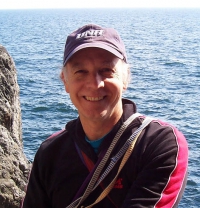 Dr. Lawrence (Larry) Hamilton is a professor of sociology at the University of New Hampshire. Since 1992, he has conducted interdisciplinary studies around the circumpolar North, supported by a series of grants from the U.S. National Science Foundation. Results from this work include case studies, technical analysis, and comparative overviews of resource-dependent communities in Alaska, Newfoundland, Greenland, Iceland, the Faroe Islands and Norway. He has been an active participant in many national and international working groups on the human dimensions of Arctic environmental change. Combining his Arctic and survey interests, some recent studies explore what the general public knows and believes about polar regions. Informal notes about the polar surveys appear in “Polar Polling” on the Polar Hub website.
Dr. Lawrence (Larry) Hamilton is a professor of sociology at the University of New Hampshire. Since 1992, he has conducted interdisciplinary studies around the circumpolar North, supported by a series of grants from the U.S. National Science Foundation. Results from this work include case studies, technical analysis, and comparative overviews of resource-dependent communities in Alaska, Newfoundland, Greenland, Iceland, the Faroe Islands and Norway. He has been an active participant in many national and international working groups on the human dimensions of Arctic environmental change. Combining his Arctic and survey interests, some recent studies explore what the general public knows and believes about polar regions. Informal notes about the polar surveys appear in “Polar Polling” on the Polar Hub website.
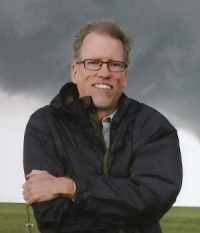 Bob Henson, who is probably the world's premier science writer in meteorology and climate change, is a full-time blogger on weather and climate change topics with Weather Underground. From 1990 through 2014, Bob was a writer/editor/media relations specialist for the University Corporation for Atmospheric Research/National Center for Atmospheric Research (NCAR) in Boulder, Colorado. Bob earned his Bachelor's degree in meteorology from Rice University in 1983, and went on to get a Master's degree in Journalism from the University of Oklahoma in 1988, where he engaged in a fair bit of storm chasing on the side. He has written many books on weather and climate change, including ”The Thinking Person’s Guide to Climate Change” and the number one textbook for 101-level college meteorology courses, Meteorology Today (11th edition). Bob is a contributing editor of Weatherwise magazine and has also written more than 50 articles for Nature, Scientific American, Discover, Sierra, The Guardian, AIR & SPACE/Smithsonian, and other media outlets.
Bob Henson, who is probably the world's premier science writer in meteorology and climate change, is a full-time blogger on weather and climate change topics with Weather Underground. From 1990 through 2014, Bob was a writer/editor/media relations specialist for the University Corporation for Atmospheric Research/National Center for Atmospheric Research (NCAR) in Boulder, Colorado. Bob earned his Bachelor's degree in meteorology from Rice University in 1983, and went on to get a Master's degree in Journalism from the University of Oklahoma in 1988, where he engaged in a fair bit of storm chasing on the side. He has written many books on weather and climate change, including ”The Thinking Person’s Guide to Climate Change” and the number one textbook for 101-level college meteorology courses, Meteorology Today (11th edition). Bob is a contributing editor of Weatherwise magazine and has also written more than 50 articles for Nature, Scientific American, Discover, Sierra, The Guardian, AIR & SPACE/Smithsonian, and other media outlets.
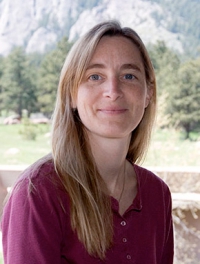 Dr. Marika M. Holland is a Senior Scientist in the Oceanography Section of the Climate and Global Dynamics Division of NCAR’s Earth System Laboratory. Her research interests are focused on the role of sea ice in the climate system, including secular sea ice change, ice-ocean-atmosphere interactions, abrupt high latitude climate change, and polar climate variability. Dr. Holland has contributed to sea ice model developments for the Community Climate System Model and new Community Earth System Model, including work that enables the quantification of the role of black carbon deposition on Arctic sea ice loss. Dr. Holland has served for 8 years as a co-chair for the Community Climate System Model Polar Climate Working Group, which is responsible for providing the sea ice model component of the coupled system model and for evaluating polar climate simulations of the model. Dr. Holland has also been an active member of numerous committees and advisory panels for the Arctic Research Consortium of the U.S. and the National Science Foundation, among others. She has been a contributing author on the Intergovernmental Panel on Climate Change third and fourth assessment reports and contributed to numerous other national and international assessments on the changing Arctic climate.
Dr. Marika M. Holland is a Senior Scientist in the Oceanography Section of the Climate and Global Dynamics Division of NCAR’s Earth System Laboratory. Her research interests are focused on the role of sea ice in the climate system, including secular sea ice change, ice-ocean-atmosphere interactions, abrupt high latitude climate change, and polar climate variability. Dr. Holland has contributed to sea ice model developments for the Community Climate System Model and new Community Earth System Model, including work that enables the quantification of the role of black carbon deposition on Arctic sea ice loss. Dr. Holland has served for 8 years as a co-chair for the Community Climate System Model Polar Climate Working Group, which is responsible for providing the sea ice model component of the coupled system model and for evaluating polar climate simulations of the model. Dr. Holland has also been an active member of numerous committees and advisory panels for the Arctic Research Consortium of the U.S. and the National Science Foundation, among others. She has been a contributing author on the Intergovernmental Panel on Climate Change third and fourth assessment reports and contributed to numerous other national and international assessments on the changing Arctic climate.
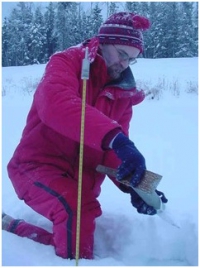 Dr. Martin Jeffries is the Executive Director of the Interagency Arctic Research Policy Committee (IARPC). Prior to this appointment, Jeffries served as Program Officer and Arctic Science Advisor at the Office of Naval Research and as a Program Director at the National Science Foundation for the Arctic Observing Network in the Division of Arctic Sciences, Office of Polar Programs. His cryospheric processes research has taken him to both the Arctic and the Antarctic to investigate ice shelves, icebergs, sea ice and lake ice. While a professor at the University of Alaska Fairbanks, Dr. Jeffries created the very successful Alaska Lake Ice and Snow Observatory Network (ALISON), an integrated research and education project in which K–12 teachers and students were his scientific partners in an investigation of lake ice growth, snow accumulation and conductive heat flux in Alaska.
Dr. Martin Jeffries is the Executive Director of the Interagency Arctic Research Policy Committee (IARPC). Prior to this appointment, Jeffries served as Program Officer and Arctic Science Advisor at the Office of Naval Research and as a Program Director at the National Science Foundation for the Arctic Observing Network in the Division of Arctic Sciences, Office of Polar Programs. His cryospheric processes research has taken him to both the Arctic and the Antarctic to investigate ice shelves, icebergs, sea ice and lake ice. While a professor at the University of Alaska Fairbanks, Dr. Jeffries created the very successful Alaska Lake Ice and Snow Observatory Network (ALISON), an integrated research and education project in which K–12 teachers and students were his scientific partners in an investigation of lake ice growth, snow accumulation and conductive heat flux in Alaska.
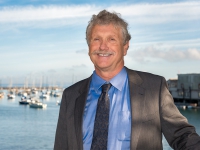 Dr. Brendan Kelly is the Executive Director of the Study of Environmental Arctic Change (SEARCH), providing leadership and strategic direction to the program and forging strong cooperative relationships between academia, agencies, and stakeholders. Kelly's career in Arctic research and policy includes serving on the faculty and administration of the University of Alaska, as a research scientist with NOAA's National Marine Mammal Laboratory, Deputy Director of Arctic Sciences at the National Science Foundation, Chief Scientist of the Monterey Bay Aquarium, and Assistant Director for Polar Science in the White House Office of Science and Technology Policy. Currently, he serves on the National Academy of Sciences' Polar Research Board and as a Senior Fellow at the Center for the Blue Economy, Middlebury Institute of International Studies. Kelly earned his PhD from Purdue University, a Master of Science degree from the University of Alaska Fairbanks, and a Bachelor of Arts degree from the University of California, all in biology.
Dr. Brendan Kelly is the Executive Director of the Study of Environmental Arctic Change (SEARCH), providing leadership and strategic direction to the program and forging strong cooperative relationships between academia, agencies, and stakeholders. Kelly's career in Arctic research and policy includes serving on the faculty and administration of the University of Alaska, as a research scientist with NOAA's National Marine Mammal Laboratory, Deputy Director of Arctic Sciences at the National Science Foundation, Chief Scientist of the Monterey Bay Aquarium, and Assistant Director for Polar Science in the White House Office of Science and Technology Policy. Currently, he serves on the National Academy of Sciences' Polar Research Board and as a Senior Fellow at the Center for the Blue Economy, Middlebury Institute of International Studies. Kelly earned his PhD from Purdue University, a Master of Science degree from the University of Alaska Fairbanks, and a Bachelor of Arts degree from the University of California, all in biology.
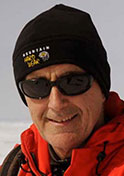 Dr. Don Perovich is a Research Geophysicist at the Cold Regions Research and Engineering Laboratory in Hanover, NH and is an Adjunct Professor in the Thayer School of Engineering at Dartmouth College. His primary research interest is understanding the Arctic system and its role in global climate change. The central focus of his research is deceivingly simple to state: where does all the sunlight go? More precisely, how does the incident solar radiation interact with sea ice and snow? He has participated in numerous Arctic field experiments including serving as the Chief Scientist of field campaigns studying the electromagnetic properties of sea ice (EMPOSI) and the surface heat budget of the Arctic (SHEBA).
Dr. Don Perovich is a Research Geophysicist at the Cold Regions Research and Engineering Laboratory in Hanover, NH and is an Adjunct Professor in the Thayer School of Engineering at Dartmouth College. His primary research interest is understanding the Arctic system and its role in global climate change. The central focus of his research is deceivingly simple to state: where does all the sunlight go? More precisely, how does the incident solar radiation interact with sea ice and snow? He has participated in numerous Arctic field experiments including serving as the Chief Scientist of field campaigns studying the electromagnetic properties of sea ice (EMPOSI) and the surface heat budget of the Arctic (SHEBA).
